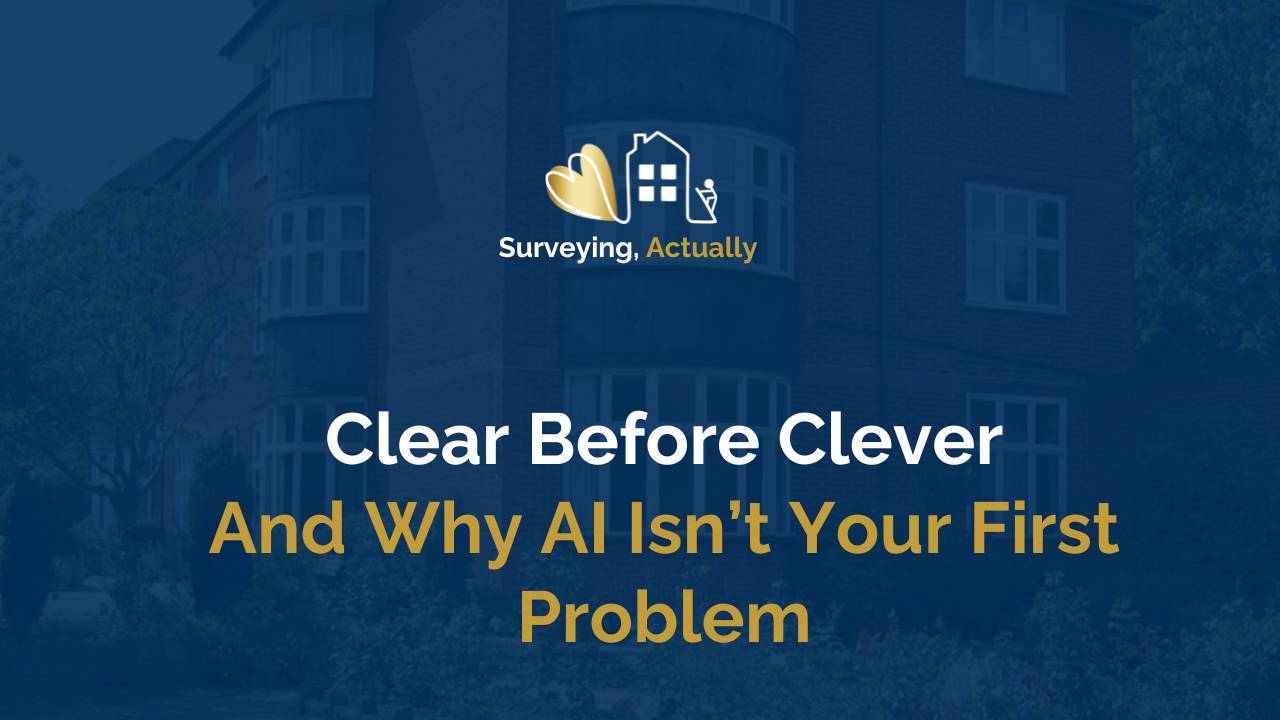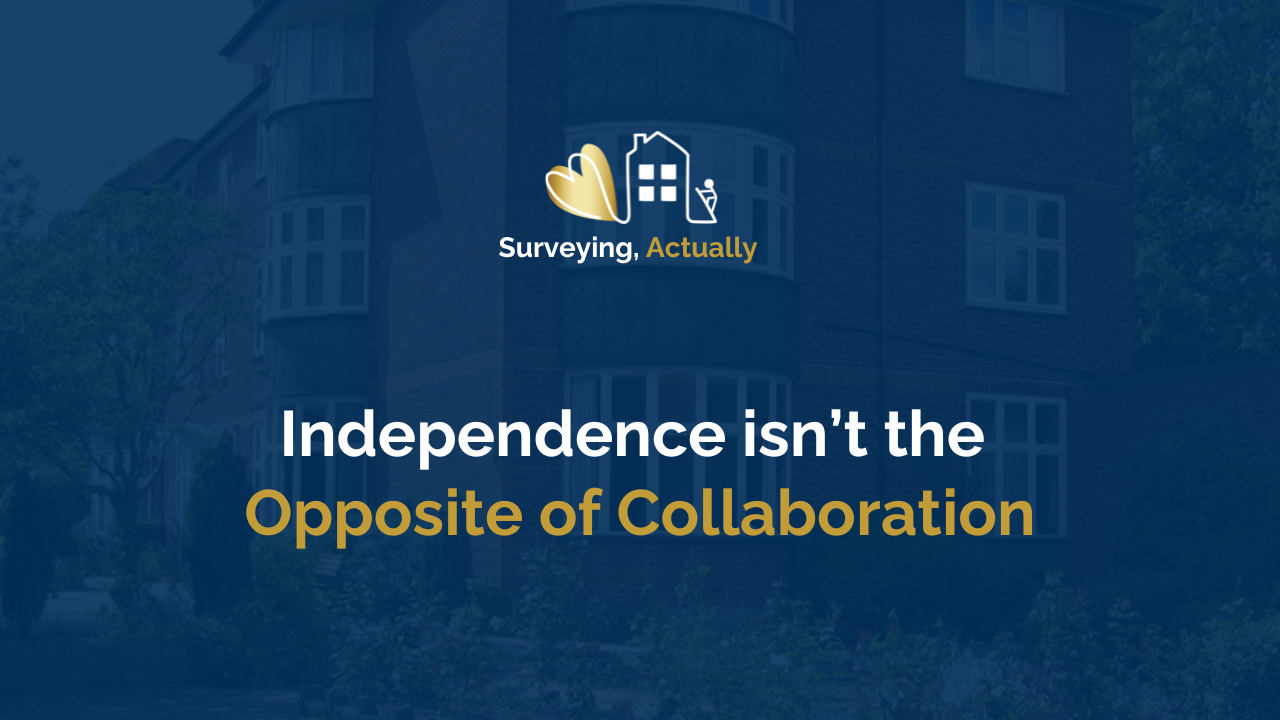A Guide for Self-Employed Surveyors with ADHD
Oct 01, 2024
Managing a business as a self-employed individual with ADHD can present unique challenges. The UK's Access to Work (AtW) scheme provides practical and financial support to overcome work-related obstacles resulting from a disability or health condition.
Many surveyors, architects and people working in various practical construction roles miss out on getting support because they don’t know about it. Numerous articles call for more awareness, panels discuss their experience, and organisations celebrate awareness initiatives, but there is little practical help, and none mention the government funding, which could make a significant difference to many.
I have written this guide for those who own their businesses, but the same funding applies to those employed. If you are employed, you should speak to your employer about the support you need and how best to apply.
Applying for Access to Work can be pretty daunting, not least because the application process is not neurodiverse-friendly. Seeking support from professionals or ADHD communities can offer emotional reinforcement. If you are an RICS member, you can contact Lionheart for help.
What Is Access to Work?
Access to Work is an employment support program funded by the UK government. It provides grants to disabled people to help them start or stay in work. The scheme covers a range of support services and equipment tailored to individual needs, ensuring that disabilities do not become barriers to employment success.
If you are a surveyor with a neurodiversity such as ADHD, autism or dyslexia, you may be able to benefit from the grant to support you in your work. And yes, whether you subscribe to it or not, the term disability is used in the context of the grant and throughout the application process and that makes even applying very triggering for many professionals.
Understanding Access to Work
Access to Work is a discretionary grant, not a benefit or entitlement, meant to help people with disabilities maintain employment by funding support that addresses work-related challenges. It is there to enable you to access work. It's important to remember:
- It's a Grant, Not a Benefit: Access to Work provides grants, so you don't have to repay the money you receive. It's not considered a benefit and isn't means-tested.
- Focus on Disabilities: The scheme is specifically for those who identify as disabled under the Equality Act 2010. While it's common to focus on strengths and abilities, using the term "disabled" aligns with the language and criteria of Access to Work.
- Individualised Support: Each person's experience with their disability is unique. The support provided is tailored to your specific barriers and needs in the workplace.
- Not for Reasonable Adjustments: Employers are legally required to make reasonable adjustments under the Equality Act. Access to Work covers additional support beyond these adjustments.
Eligibility and Initial Application
To apply, you must be employed or self-employed with a minimum turnover. When starting as a new business owner, you may need to submit a business plan to demonstrate viability.
To qualify for Access to Work, you must:
- Be over 16 years old.
- Live in England, Scotland, or Wales.
- Have a disability or health condition that affects your ability to work. You do not need a formal diagnosis to apply for the grant.
- Be employed or self-employed (including gig workers and freelancers).
- Be about to start a job or work trial.
Note: The scheme does not cover unemployment benefits or job search support.
How the Access to Work Grant Works
AtW reimburses expenses rather than providing funds upfront. Therefore, you will need receipts for any purchased equipment to be reimbursed. However, with agreement, payments can sometimes go directly to suppliers. Your support workers are usually paid after their invoices have been submitted and paid by AtW, so it can cause a delay, which will need to be agreed with your support worker in advance.
What Access to Work Doesn't Cover
- Standard Business Costs: Equipment or services anyone would need, such as standard laptops or basic office furniture.
- Business Start-Up Costs: Funding for starting a business, including initial training or marketing.
- Treatment or Diagnostics: Medical treatments or diagnostic assessments for your condition.
- Personal Benefits: Support must be work-related, not for personal life improvements.
- Mentoring for Career Development: Mentoring focused on career growth rather than overcoming disability-related barriers.
Applying for Access to Work Support
Tips for a Successful Application
- Be Specific About Barriers: Clearly explain how ADHD affects your work and provide examples of tasks you struggle with due to your condition.
- Use Appropriate Language: Use terms like "disabled" to align with Access to Work criteria. Describe how support will "enable" you rather than do the work for you.
- Prepare Documentation: Have financial documents or a business plan ready and keep records of any adjustments you've already made.
- Proactively Address Challenges: Mention any strategies or tools you've tried and explain why additional support is necessary.
- Choose Email Communication: Opt for email to have written records and avoid missed calls. Respond promptly to any requests from your case manager - they will call twice, and if you miss it, you will be at the back of the queue again to reapply.
- Know Your Support Needs: Research the types of support available and be prepared to suggest specific solutions.
The Application Process
- Submit Your Application: You must complete the online application form on the UK government website. Provide details about your disability, work situation, and the support you think you need.
- Wait for Contact: After submission, there is typically a 14 to 20-week waiting period. Indicate your preferred contact method. Email is recommended to avoid missed calls.
- Eligibility Check: A case manager will contact you to verify your eligibility. They may ask for proof of earnings (for self-employed individuals, this could be a business plan or financial forecast).
- Needs Assessment: Discuss the challenges you face due to your disability. You might be referred for a Workplace Assessment conducted by an external assessor.
- Decision and Grant Award: Based on the assessment, the case manager decides on the support to be provided. You receive a formal award letter detailing the grant.
- Implement Support: Purchase equipment or arrange services as outlined in your award. Keep receipts and invoices for reimbursement claims.
Types of Support Available
Aids and Equipment
Access to Work can fund specialised equipment to help you perform your job effectively. Examples include:
- Sit-stand desks and ergonomic chairs.
- Noise-cancelling headphones.
- Assistive software (e.g., speech-to-text programs).
- Organisational tools and apps.
Support Workers
A support worker can provide personalised assistance, such as:
- Helping with planning and organisation.
- Note-taking during meetings and site inspections.
- Time management support.
Coaching and Training
- Job Coaching: This is specialised coaching from an ADHD coach to develop strategies for managing ADHD symptoms at work.
- Disability Awareness Training: Training to help colleagues understand your condition (more common in employed settings).
Navigating Support Worker Roles
Understanding the terminology used by Access to Work is crucial to ensure you get the right support.
Support Worker:
- A general term encompassing various support roles.
- For ADHD, this often means a job coach or job aide.
Job Coach:
- Provides short-term, intensive support.
- Helps develop coping strategies and workplace skills.
Job Aide:
- Offers ongoing assistance with specific tasks.
- Helps mitigate barriers resulting from ADHD symptoms.
The Workplace Assessment
If you’re unsure about the specific support you need, you can ask, or AtW may also refer you for a workplace assessment - even if you work for yourself and from home. This evaluation helps pinpoint necessary aids or support workers to assist in overcoming disability-related obstacles. This is a conversation about your work, but it can also be helpful to have someone with you who understands the process and supports you on the call, usually done as a video call.
Tips for Support Work:
- Enabling, Not Doing: Be specific about your disability-related needs without framing them as general business assistance. For instance, state the need for help managing ADHD-related challenges rather than simply needing "administrative support."
- Directed by You: You should be making decisions and directing the support worker's activities.
- Not Replacing Staff: Support workers are not meant to replace roles typically requiring additional employees.
Reconsideration and Renewal
You can file for reconsideration within four weeks if denied support, providing additional documentation or clarifying needs. Some common reasons for denial include a lack of clarity in describing how support directly addresses work barriers.
- Reconsideration: You have four weeks to request a reconsideration of the decision.
- Provide Additional Evidence: Submit any new information that supports your case.
- Renewals and Re-evaluations: Every 12 months, AtW reviews the support arrangement to ensure continued relevance.
Securing support through the Access to Work scheme can significantly enhance your ability to manage ADHD-related challenges in your work and business. While the application process may seem daunting, understanding the principles and preparing thoroughly can increase your chances of a successful outcome. Remember, the goal of Access to Work is to level the playing field, enabling you to thrive in your professional life enabling you to focus on what you do best.
Disclaimer: This guide provides general information and is not a substitute for professional advice. For personalised assistance, consider consulting with a professional experienced in Access to Work applications.





